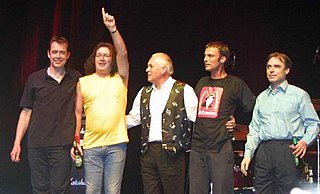
Procol Harum were an English rock band formed in Southend-on-Sea, Essex, in 1967. Their best-known recording is the 1967 hit single "A Whiter Shade of Pale", one of the few singles to have sold more than 10 million copies. Although noted for their baroque and classical influence, Procol Harum's music is described as psychedelic rock and proto-prog with hints of the blues, R&B, and soul.

"A Whiter Shade of Pale" is a song by the English rock band Procol Harum that was issued as their debut record on 12 May 1967. The single reached number 1 in the UK Singles Chart on 8 June and stayed there for six weeks. Without much promotion, it reached number 5 on the US Billboard Hot 100. One of the anthems of the 1967 Summer of Love, it is one of the most commercially successful singles in history, having sold more than 10 million copies worldwide. In the years since, "A Whiter Shade of Pale" has become an enduring classic, with more than 1,000 known cover versions by other artists.
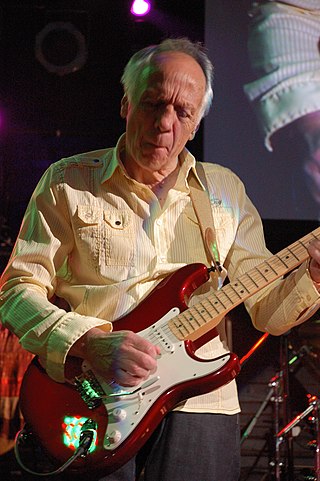
Robin Leonard Trower is an English rock guitarist who achieved success with Procol Harum throughout 1967–1971, and then again as the bandleader of his own power trio known as the Robin Trower Band.
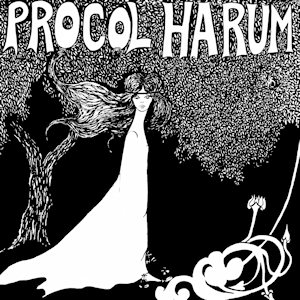
Procol Harum is the debut studio album by English rock band Procol Harum. It was released in September 1967 by record label Deram in the US, following their breakthrough and immensely popular single "A Whiter Shade of Pale". The track does not appear on the UK version of the album, but was included on the US issue. The UK version of the album was released in December 1967 by record label Regal Zonophone.

The Prodigal Stranger is the tenth studio album by Procol Harum, released in 1991. Recorded after a 14-year break, it met with an underwhelming response from listeners but served to kick off a largely successful reunion for the band.

Shine On Brightly is the second studio album by English rock band Procol Harum, released in 1968 by record labels Regal Zonophone and A&M.
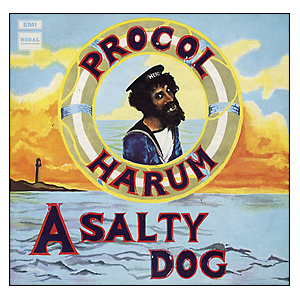
A Salty Dog is the third studio album by English rock band Procol Harum, released in 1969 by record labels Regal Zonophone and A&M.

Broken Barricades is the fifth studio album by English rock band Procol Harum, released the same week they began their U.S. tour, on 3 April 1971. The UK release was on 11 June 1971. It was guitarist Robin Trower's last recording with the group until The Prodigal Stranger (1991).

Procol Harum Live: In Concert with the Edmonton Symphony Orchestra, by the English band Procol Harum together with the Edmonton Symphony Orchestra, was released in 1972; it was recorded at the Northern Alberta Jubilee Auditorium, in Edmonton, Alberta, Canada on 18 November 1971. The album reached No. 7 in Canada and was very successful on the Billboard Top 200, peaking at No. 5. It is the band's best-selling album, certified Gold by the RIAA. The live version of "Conquistador" from this album became a popular hit on both pop and progressive radio in the United States and reached the top 20 of the Billboard Hot 100, and the top 10 in several other countries.

Grand Hotel is the sixth studio album by Procol Harum. Released in 1973, it signalled a change of direction for the band. Guitarist Dave Ball, who had joined the band for their live album the previous year, left shortly after the photo shoot for the proposed album's cover, to be replaced by Mick Grabham. Grabham's head was superimposed on the front and back cover of the album on Ball's body. Although the band had gone through significant personnel changes in previous years, the band would enter its most stable phase with this lineup.

Exotic Birds and Fruit is the seventh studio album by British progressive rock band Procol Harum. It was released in 1974. The cover artwork for the album is by Jakob Bogdani, a noted Hungarian artist whose paintings centered on exotic birds and fruit.

Procol's Ninth is the eighth studio album by Procol Harum, and was released in August 1975. Produced by songwriters Jerry Leiber and Mike Stoller, Procol's Ninth featured a slightly different direction from the previous album, with a much starker sound than Chris Thomas's more elaborate productions. According to an interview with guitarist Mick Grabham, conducted by Roland Clare for the 2009 reissue, Leiber and Stoller focused less on the production sound and more on "the structure of the songs". The band appeared on the cover of the album in a straightforward unassuming photograph, mirroring the sound of the album itself. The cover featured simulations of each band member's signature.
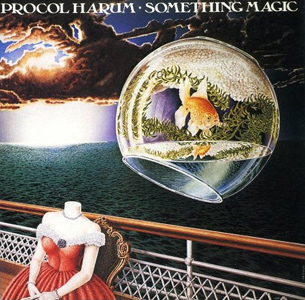
Something Magic is the ninth studio album by Procol Harum, and was released in 1977.

Matthew Charles Fisher is an English musician, songwriter and record producer. He is best known for his longtime association with the rock band Procol Harum, which included playing the Hammond organ on the 1967 single "A Whiter Shade of Pale", for which he subsequently won a songwriting credit. In his later life he became a computer programmer, having qualified from Cambridge University.

Keith Stuart Brian Reid was an English lyricist and songwriter.

Ain't Nothin' to Get Excited About is an album of rock and roll songs recorded in 1970 by the members of Procol Harum under the name Liquorice John Death. It was not released until 1997.
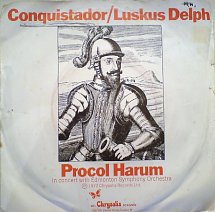
"Conquistador" is a song by the English rock band Procol Harum. Written by Gary Brooker and Keith Reid, it originally appeared on the band's 1967 self-titled debut album. It was later released as a single from the band's 1972 live album Procol Harum Live: In Concert with the Edmonton Symphony Orchestra. It is one of the band's most famous and popular songs and their third Top 40 hit on the U.S. Billboard Hot 100, peaking at number 16.
The Paramounts were an English beat group based in Southend-on-Sea, Essex. They had one hit single with their cover version of "Poison Ivy", which reached No. 35 on the UK Singles Chart in 1964, but are primarily known as the precursor to Procol Harum.

"A Salty Dog" is a song by the English rock band Procol Harum. Written by Gary Brooker and Keith Reid, it was released as the lead single off the band's 1969 album A Salty Dog. It was also included on the 1972 album Procol Harum Live: In Concert with the Edmonton Symphony Orchestra.


















